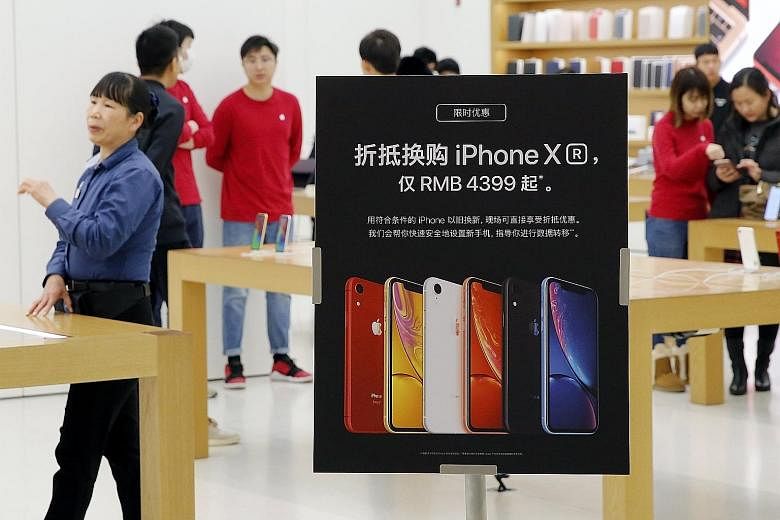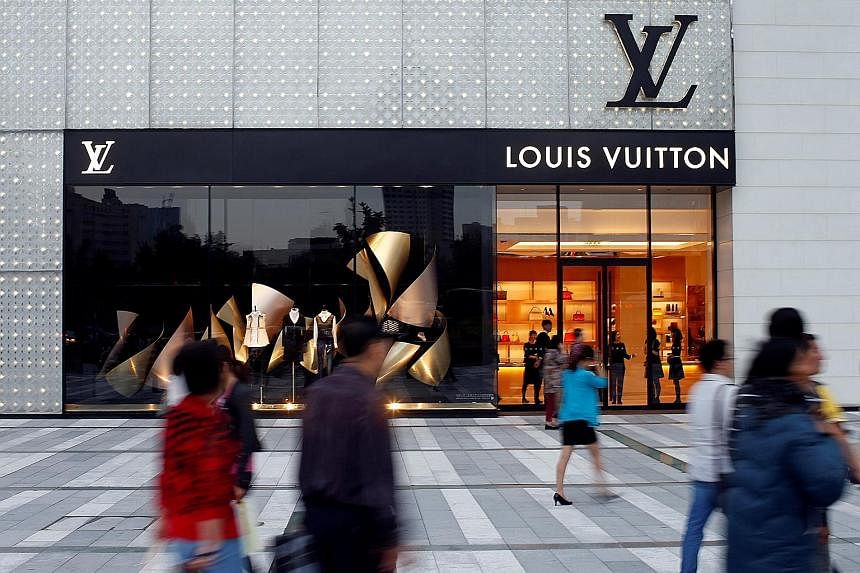HONG KONG • After Apple's shock profit warning, investors were quick to make the connection: If Chinese consumers are cutting back on iPhones, Louis Vuitton handbags could be next.
Apple's sales revision cascaded through global markets, hitting suppliers and rivals, but also a raft of luxury-goods companies that rely on the same clientele who like to splurge on Apple's latest products.
Shares of Gucci parent Kering, LVMH Moet Hennessy Louis Vuitton, Burberry Group and Riche-mont, the parent of jeweller Cartier, all declined in the wake of Apple's shortfall.
"It is going to become significantly more challenging to do well in China because the market is tightening up," said Mr David Roth, chief executive of WPP's The Store global retail practice. "This is a challenging signal that people need to button down and understand China better and prepare."
Apple cut its quarterly revenue outlook to US$84 billion (S$114 billion), from as much as US$93 billion, blaming it in part on a pullback in demand within China.
That set off warning bells throughout the luxury industry because Chinese consumers account for about 30 per cent of the US$1 trillion in luxury-goods spending worldwide, according to Euromonitor International.
Prada shares fell as much as 3.6 per cent in Hong Kong yesterday. In Europe on Thursday, Kering fell 5.5 per cent, the most since October, while LVMH dropped 3.8 per cent and Burberry tumbled 5.9 per cent.
For years, companies from LVMH to Tiffany & Co have targeted China's wealthy tourists, who sought out pricey handbags, jewellery and other luxury items while on vacation in Paris to Dubai.
Investors are worried that the sliding yuan, China's trade war-hit economy and a government crackdown on overseas purchases could dent demand.
Richemont, whose shares fell by 2.8 per cent on Thursday, has already been feeling the heat. The Swiss watch and jewellery-goods maker signalled in November that Chinese sales growth has slowed. Others have maintained a more bullish tone, with LVMH and Kering citing robust China sales in October and saying that they welcome a shift to domestic sales.
A key test for retailers will come with the week-long Chinese New Year holiday, which begins on Feb 5.
About two-thirds of those sales take place outside the country as tourists open their wallets while travelling abroad, taking advantage of better selection and cheaper prices than available at home.
But with the US trade war weighing on China's stocks and currency, and President Xi Jinping's government trying to bolster a faltering economy, more mainlanders are choosing to do their shopping inside China rather than on overseas trips.
"There is clearly a shift that has started to happen in the consumption pattern: Chinese people are buying more in China," said Mr Pascal Martin, a partner in Hong Kong with OC&C Strategy Consultants.
Taxes on imported clothing, which had been as high as 25 per cent, are now just 7.1 per cent.
Companies are scrambling to adjust, opening more stores in China or partnering local online outlets such as Alibaba Group Holding's Tmall.
Ermenegildo Zegna, which has stores in 35 Chinese cities, last month opened a flagship store on Tmall Luxury Pavilion, following a similar move by Italian fashion house Valentino in November.
"Luxury brands still benefit from a formidable capacity to recruit new consumers in China," HSBC analysts led by Mr Erwan Rambourg said in a note.
BLOOMBERG
SEE OPINION: Is this the end of the Age of Apple?


